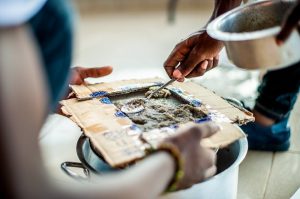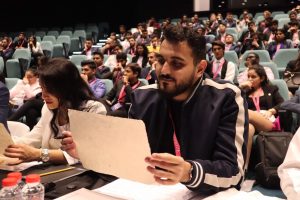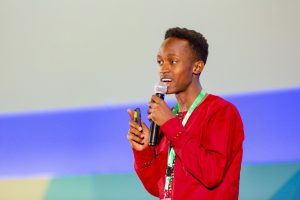Youth entrepreneurship and engagement are critical to the long-term sustainability of green growth. As part of ongoing work in Rwanda, GGGI works to support and amplify the initiatives of young, emerging leaders combining climate action and sustainable business models to develop new products and services. Since establishing the Rwanda Country office in 2015, GGGI has supported youth organizations through initiatives such as the YouthConnekt Competition, training in climate change diplomacy, and attendance at COP24 in Katowice, Poland.
Since 2018, GGGI has worked with two organizations – Student Energy, and Youth Climate Lab – to establish the Greenpreneurs initiative. The program provides mentoring, training, and guidance over the course of 12 weeks to help young entrepreneurs to develop their business plan and to compete for small-scale seed funding.
UMUTI is one of 15 start-ups selected for the Greenpreneurs competition. UMUTI is an enterprise that uses fiber from banana stalks to produce paper and paper bags. In 2008, Rwanda banned plastic bags, becoming a global leader in addressing the challenge of plastic pollution. In 2019, the Government of Rwanda went a step further, announcing that these steps have not only eliminated much of the plastic pollution seen in neighboring countries, but has also catalyzed the development of new businesses that seek to fill market demands for plastic-free products. Recognizing a need for alternative materials, four young entrepreneurs from Rwanda have developed a company called UMUTI, they developed a business concept that uses banana and plantain trunks that are left over after harvest to create eco-friendly paper packaging bags.

UMUTI paperbag

Prototype
During the Greenpreneurs competition, GGGI Rwanda staff are supporting the UMUTI team by providing input into their marketing strategy, product testing and development, and connecting them with critical key government entities such as the National Industrial Research and Development Agency (NIRDA) as well as the Rwanda Environment Management Authority (REMA). The UMUTI team recently met with REMA Director General Juliet Kabera and has solicited input for refining their business plan.

UMUTI team with DG REMA Juliet Kabera
“GGGI Rwanda recognizes the importance of job creation and the development of new enterprises to tackle both youth unemployment as well as the challenges of sustainable development and urbanization. The UMUTI business model is one that is fully aligned with national level SDG and NDC targets in waste valorization and reuse that will be imperative for sustaining Rwanda’s commitments to green growth, circular economy and low-carbon development,” stated GGGI Rwanda Country Representative, Inhee Chung.
The Government of Rwanda has committed to ambitious targets to halt rates of deforestation due to its contribution to biodiversity loss and habitat disruption as well as the important role forests and tree cover play in reducing soil erosion and reducing GHG emissions. According to Global Forest Watch, in 2010, Rwanda had 406kha of natural forest. In 2019, it lost 1.06kha of natural forest, equivalent to 239kt of CO₂ of emissions. Forest plantations make 67% of all forest cover across the country. Tree cover is a critical element of flood and landslide resilience in Rwanda. By utilizing a process that can harness the remnants of banana and plantain trees for productive use, the process eliminated the need to harvest timber or other virgin materials to provide locally produced paper, bags, and other items.

UMUTI paper presented in Dubai
Globally, the circular economy is estimated to be worth 4.5 trillion USD. Initiatives that employ the use and reuse of discarded and undervalued materials have the capacity to enact transformative change in key sectors such as solid waste management while reducing GHG emissions. In Kigali, an estimated 0.57 kg of solid waste per person per day with the majority of waste being produced classified as organic. UMUTI products use circular economy approaches not only to reduce the amount of waste that reaches landfill sites, but also to create valuable products that are fully biodegradable.
For more information on UMUTI, visit their website or follow them on twitter ,view their pitch deck here. For information on their products, contact info@umuti.co.
UMUTI team :

Nadine
Ndahiro Nadine is a passionate environmentalist; she is currently pursuing an undergraduate degree in global challenges at African Leadership University, specializing in empowering women in the conservation sector. During her professional career, Nadine has gained extensive knowledge and a skill set in operation and marketing gained from ISON BPO and Costwise Contractors. She wants to play a crucial role in the conservation sector where the wins of women outnumber the losses.

Kevin
SHEMA Kevin is a student at African Leadership University for the 2018-2019 academic year. Before joining African Leadership University, he studied civil engineering at the University of Rwanda. Kevin is also part of the ChangemakerXchange and Clinton Global initiative alumni. Kevin is passionate about solving complex problems in large markets, particularly within the field of sustainability.

Arsene
Gatera Arsene solves big problems with laughter; he is currently pursuing an undergraduate degree in global challenges at African Leadership University, specializing in creating employment in the conservation sector. He has a general mechanics background. He is passionate about fostering the creation of green jobs for youth and encouraging them to be problem solvers on poverty and unemployment issues.

Thierry
Irankunda Shema Thierry Henry has viewed life from many bridges as a data analyst, sign language interpreter, entrepreneur, gamer, and others. Before joining African Leadership University, he studied data analytics at the University of Rwanda. For Thierry, a good day is always a productive day. He is passionate about the intersection of technology and entrepreneurship.